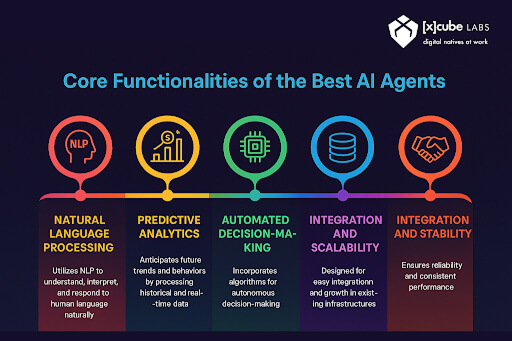 1-800-805-5783
1-800-805-5783 
Artificial Intelligence (AI) agents have emerged as transformative digital tools, revolutionizing the way businesses operate and developers approach their work. With capabilities that extend from automating mundane tasks to making complex strategic decisions, these intelligent agents have become essential tools for organizations seeking efficiency, accuracy, and innovation. The best AI agents for small businesses are enabling new levels of performance and competitiveness across industries.
This guide explores the concept of the best AI agents in-depth, highlighting their functionalities, advantages, and how businesses and developers can effectively utilize them to stay ahead in a competitive landscape.
The best AI agents are sophisticated software systems designed to perform tasks autonomously. They integrate several advanced AI techniques, such as machine learning, natural language processing (NLP), deep learning, and predictive analytics, enabling them to operate with minimal human oversight. These agents handle tasks ranging from simple, repetitive routines, such as data entry and customer inquiries, to complex, multifaceted processes, including predictive modeling and strategic planning. They are also being rapidly adopted as the best AI agents for business automation.
The best AI agents typically learn from interactions and data, continually improving their capabilities. By leveraging this adaptive learning, they become increasingly proficient in managing complex workflows, thereby significantly boosting productivity and accuracy.
Businesses and developers benefit immensely from integrating the best AI agents into their operations. For businesses, automating repetitive tasks enables human resources to focus on strategic, high-value activities. This optimization leads to increased productivity and improved operational efficiency, which is essential in a fast-paced, competitive environment. Additionally, the best AI agents for business automation deliver deeper insights by analyzing large datasets, facilitating informed strategic decisions.
Smaller organizations, in particular, can benefit from the best AI agents for small businesses, which offer scalable solutions tailored to limited resources while still delivering high-impact automation and analytics.

Developers find the best AI agents particularly advantageous for streamlining software development processes. They can automate code generation, debugging, and testing, significantly reducing development time and errors. Moreover, the capabilities of the best AI agents for business extend to continuous integration and deployment, ensuring smoother, faster, and more reliable software delivery cycles.
To effectively fulfill their roles, the best AI agents must possess several essential functionalities:
Natural Language Processing (NLP): The best AI agents utilize NLP to understand, interpret, and respond to human language naturally, enabling intuitive interactions in customer service, virtual assistance, and support scenarios.
Predictive Analytics: By processing historical and real-time data, the best AI agents can anticipate future trends and behaviors, enabling proactive decision-making and planning —a critical aspect of business agility.
Automated Decision-Making: Effective AI agents incorporate algorithms that enable autonomous decision-making capabilities, which are crucial for operational efficiency and prompt responses in complex scenarios.

Data Management: The best AI agents handle both structured data (organized in databases) and unstructured data (text, images, videos). This comprehensive data management capability ensures thorough analysis and valuable insights.
Integration and Scalability: The best AI agents are designed for easy integration within existing technological infrastructures, minimizing disruption and maximizing efficiency. Scalability ensures they grow in parallel with business needs, maintaining performance standards irrespective of increasing workloads.
AI agents can be categorized by the specific roles they fulfill within organizations, each designed to handle tasks suited to their specialized capabilities:
Sales Agents– AI sales agents autonomously handle lead generation, customer outreach, and relationship management tasks. They analyze customer behavior and sales data to optimize sales strategies, enhance conversion rates, and forecast future sales trends.
Marketing Agents– Marketing agents leverage AI to automate campaign management, market analysis, and content personalization. These agents enhance audience targeting, optimize advertising budgets, and personalize customer journeys, significantly improving marketing efficiency and ROI.
Customer Service Agents– AI-powered customer service agents manage inquiries, complaints, and support requests around the clock. Utilizing advanced natural language processing, these agents provide quick, accurate, and personalized responses, elevating customer satisfaction and loyalty.
HR and Recruitment Agents– HR agents streamline recruitment, onboarding, and employee management processes. They efficiently screen resumes, schedule interviews, and manage employee data, facilitating faster hiring processes and improved employee retention through personalized employee engagement.
Financial Management Agents– Financial management agents automate critical financial operations, such as invoicing, budget tracking, expense management, and fraud detection. Their predictive analytics capabilities provide financial forecasts, risk assessments, and real-time financial insights, ensuring strategic financial planning.
Operations and Inventory Management Agents– Operations agents optimize inventory control, supply chain management, and resource allocation. By continuously analyzing operational data, they enhance production efficiency, reduce costs, and minimize waste.
IT and Cybersecurity Agents– These agents autonomously manage network operations, system updates, threat detection, and incident response. They ensure robust cybersecurity, system reliability, and minimal downtime, which are crucial for maintaining business continuity.
By understanding and strategically leveraging these agent types, businesses and developers can choose AI agents aligned with their specific operational and strategic goals, unlocking unprecedented levels of efficiency, innovation, and competitive advantage.
When businesses integrate the best AI agents into their operations, they experience significant advantages. These AI agents improve efficiency by automating routine operations, such as data entry, transaction processing, and inventory management. This not only reduces human error but also significantly cuts operational costs by minimizing the need for manual intervention.

Advanced analytics provided by the best AI agents enable more accurate and informed decision-making processes, facilitating strategic alignment with market demands. Additionally, AI-powered customer interactions enhance customer satisfaction by offering personalized and timely responses to queries and issues, thereby increasing customer retention and loyalty.
For developers, the best AI agents are equally transformative. The automation of software testing, debugging, and deployment processes substantially accelerates software development timelines. These agents help identify bugs and vulnerabilities quickly and accurately, significantly reducing downtime and enhancing the quality of software outputs.

Moreover, developers utilize the most effective AI agents for code generation and recommendation tasks. These functionalities expedite coding processes, freeing up developers to concentrate on innovative solutions and complex problem-solving. Continuous integration and deployment (CI/CD) pipelines also benefit from AI integration, facilitating faster and more reliable software releases.
The successful integration of the best AI agents into business and development environments requires a strategic approach. Businesses must first clearly define the tasks they aim to automate and enhance. Aligning specific business objectives with the capabilities of AI agents ensures optimal outcomes and maximizes return on investment.
Evaluating integration capabilities is crucial to ensure that AI agents work seamlessly within existing systems without extensive restructuring or additional investment. Scalability considerations are critical; as organizations grow, AI agents should adapt efficiently to increased demands, maintaining their effectiveness and reliability.
Cost implications must be thoroughly assessed, balancing initial investment against long-term operational savings and productivity gains. By carefully evaluating these factors, organizations can ensure that they select the most suitable AI agents that closely align with their strategic goals and operational needs.
As AI technology continues to evolve, the capabilities of the best AI agents will significantly expand. Innovations in machine learning, NLP, and automation will lead to even more sophisticated AI agents capable of managing increasingly complex tasks with greater autonomy.
Future advancements will likely see the best AI agents integrate more deeply into everyday business and development processes, becoming indispensable elements within organizational frameworks. Businesses and developers who proactively adopt and optimize these AI-driven tools will undoubtedly gain substantial competitive advantages, positioning themselves at the forefront of technological innovation and productivity.
The best AI agents are reshaping business operations and development practices through automation, insightful analytics, and advanced decision-making capabilities. By understanding their functionalities, benefits, and integration strategies, businesses and developers can significantly enhance efficiency, reduce costs, and foster innovation. Embracing the capabilities of the best AI agents positions organizations for long-term success in a rapidly evolving technological landscape.
1. What exactly are AI agents?
AI agents are advanced software systems designed to perform tasks autonomously by using techniques like machine learning, NLP, and predictive analytics.
2. How do AI agents benefit businesses specifically?
AI agents automate routine tasks, enhance decision-making through data analytics, reduce costs, and improve customer satisfaction through personalized interactions.
3. Can AI agents help developers speed up software development?
Yes, AI agents significantly accelerate development by automating coding, testing, debugging, and streamlining continuous integration and deployment processes.
4. What should organizations consider before integrating AI agents?
Organizations should evaluate their specific automation goals, integration capabilities, scalability needs, and long-term cost implications to ensure optimal benefits.
5. Are AI agents expected to evolve further in the future?
Absolutely. Advances in machine learning and NLP will make AI agents more autonomous, capable, and deeply integrated into daily business and development operations.
At [x]cube LABS, we craft intelligent AI agents that seamlessly integrate with your systems, enhancing efficiency and innovation:
Integrate our Agentic AI solutions to automate tasks, derive actionable insights, and deliver superior customer experiences effortlessly within your existing workflows.
For more information and to schedule a FREE demo, check out all our ready-to-deploy agents here.